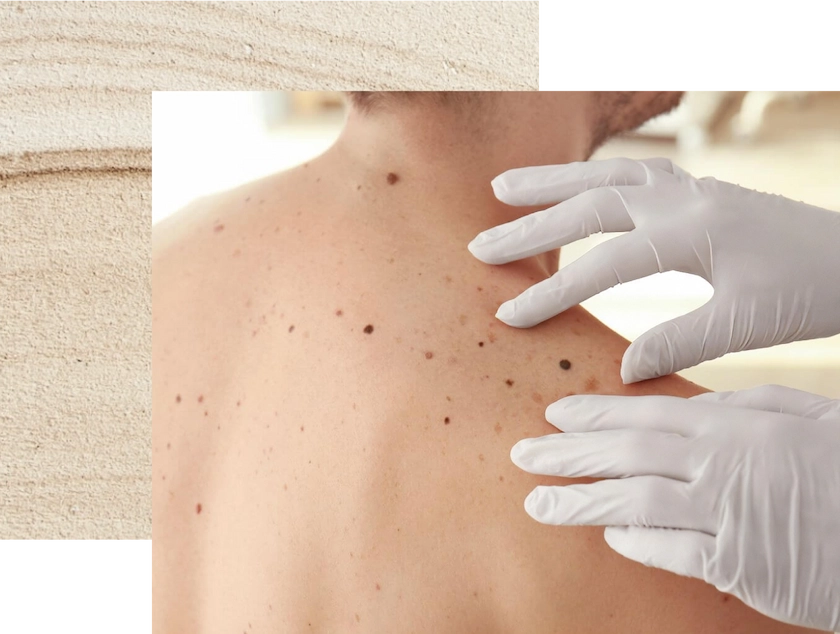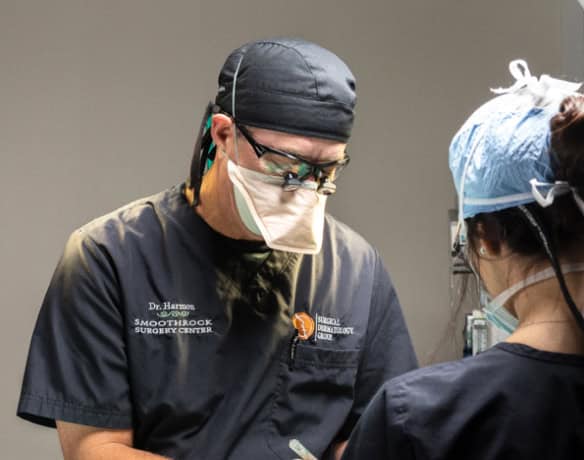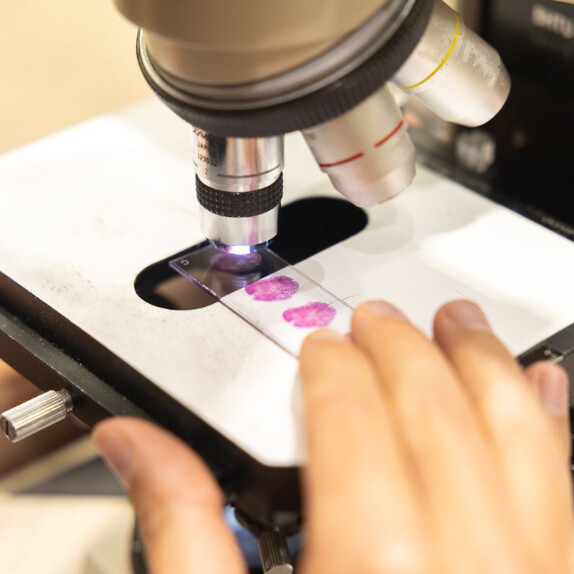Skin Cancer

Surgical Dermatology Group offers specialized care, including Mohs surgery.
Our board-certified dermatologic surgeons provide expert treatment, particularly for critical areas like the face or hands. If you're diagnosed with skin cancer or see worrying signs, schedule an appointment today.
Common Conditions & Treatments
Actinic Keratoses
Actinic Keratoses (AKs) are precancerous lesions that most commonly occur in sun exposed areas (head, neck, arms, chest and legs) as a result of chronic, cumulative sun exposure. Approximately one in…
Basal Cell Carcinoma
A basal cell carcinoma is a form of skin cancer that originates from the basal cells of the epidermis. These basal cells reside in the lower layer of the epidermis that produces new skin cells as old…
Dysplastic Nevi
Dysplastic nevi are moles that have an atypical appearance. They have a more unusual shape, color pattern and size than a typical mole. They are commonly indistinguishable from melanoma on physical…
Mohs Surgery
Surgical Dermatology Group offers specialized care, including Mohs surgery, minimizing scarring and preserving healthy skin. Our board-certified dermatologist surgeons provide expert treatment,…
Squamous Cell Carcinoma
Squamous cell cancer may occur in normal skin or in skin that has been injured or inflamed. Most skin cancers occur on skin that is regularly exposed to sunlight or other ultraviolet radiation. The…

Diagnosis
Early detection of skin cancer is key for the best outcome. It’s important to see your dermatologist regularly for a full-body skin exam.
Patients often ask what to look for when examining their own skin. Promptly investigate the following signs:
- A new skin growth that does not disappear in four to six weeks.
- Any skin lesion that continues to grow and turns red, brown, black or is multicolored.
- A mole, birthmark or beauty mark that increases in size, changes color or texture, or becomes irregular in outline.
- An open sore or wound that refuses to heal, persists for more than four weeks or heals and later reopens.
- Any skin spot or growth that becomes a sore or bleeds for several weeks or continues to itch, crust over or form a scab.

Mohs Surgery
Mohs surgery offers the highest skin cancer cure rate and delivers the best cosmetic results.
Mohs micrographic surgery is an outpatient procedure that involves removing the visible tumor and then creating a map or diagram of the cancer site. The surgeon removes smaller and smaller sections of surrounding tissue and studies those sections under a powerful microscope until all the cancer has been removed.

Dermatopathology
We are proud to offer dermatopathology services in-house. Our highly trained physicians diagnose conditions by studying them under a microscope in-house. This approach saves time and helps patients start treatment faster.
Your Surgical Visit
Our main goals are to ensure your comfort during surgery, completely remove your tumor and minimize scarring. Our dedicated team is ready to answer questions, offer support and provide extraordinary care and kindness.
Practice Preventive Care
Limit your sun exposure, wear sunscreen and dress appropriately year-round. We encourage everyone to schedule regular skin checks to detect skin conditions early and to ensure your skin looks great and remains healthy.
Please see the current list of insurance plans we accept below. If you do not see your plan, please contact your insurance company to confirm coverage.
- Aetna: HMO, PPO, Comm
- American Postal Workers Union
- Ascension Smart Health
- Blue Cross Blue Shield (BCBS): HMO, PPO, Comm
- Cigna: HMO, PPO, Comm
- Cigna HealthSpring
- Devoted Health
- Humana: HMO, PPO, Comm
- Medicare
- Multiplan
- Railroad Medicare
- TRICARE
- UnitedHealthcare (UHC): PPO, HMO, Comm, AARP
- Veterans Affairs Community Care Network (VA CCN): Managed by UHC
- Viva: HMO, PPO, Comm
That depends on your insurance plan. If your insurance plan requires a referral from your primary care physician, you will need a referral to schedule an appointment. To determine if you require a referral, or what services are covered by your plan, call your insurance company.
Please remember to complete your patient forms prior to your visit. Bring your photo ID, all insurance cards and a list of any medications you take. Create an account in our secure patient portal. Here you can update your contact and insurance information, send and review messages with providers, check your balance and see upcoming appointments.
Plan to arrive at least 20-30 minutes early if you haven’t completed your paperwork.
During your visit, our providers will review your medical history, then conduct a thorough skin examination in order to make a diagnosis. Once a diagnosis is made, you’ll receive a detailed treatment plan. We encourage you to ask questions and share any concerns you have.”
Your insurance plan dictates deductibles, copays, coinsurance, networks, etc. If you have questions or concerns, discuss them with your insurance company or your employer’s benefits coordinator. Plan to pay your copay or any payment required by your insurance at the time of your visit. If you leave a credit card on file when you check in, it will make checking out in the future a breeze.